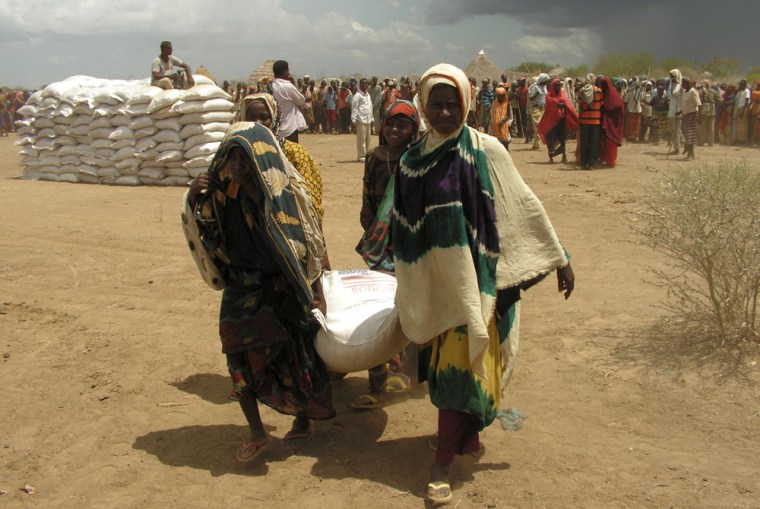Somalia's poorest are being deprived of food aid by pirates prowling waters off the coast.
The recent surge in attacks in the Indian Ocean include two in a week on U.S. aid ships with food destined for Somalia — raising the question of whether more aid ships should have naval escorts.
An American freighter loaded with food aid escaped a pirate attack Wednesday and headed to Kenya. The Liberty Sun's crew was unharmed, but the vessel took some damage.
The incident followed the rescue Monday of the captain of another U.S. ship carrying food aid, the Maersk Alabama, who had offered himself as a hostage to save his 19-man crew from the pirates.
Both ships were heading for Mombasa, Kenya, to hand over their supplies to the United Nations' World Food Program — which then takes charge of the food and sends much of it by smaller vessels under naval escort to ports in Somalia.
In this way the U.N. has been able to provide a steady stream of relief to Somalia over the last 18 months.
"The ship escort system has worked quite well," said Emilia Casella of WFP, which has been using naval escorts since November 2007. "When we've had escorts, we have had not any incidents of piracy on WFP-contracted ships."
WFP shipped 260,000 tons of food to millions of Somalis suffering from drought and violence last year, Casella said.
However, ships that are hired to pick up food for WFP or deliver it to the agency usually don't have naval escorts — leaving them vulnerable to attack.
People going hungry
The agency is worried about a cargo ship hijacked Tuesday, the Lebanese-owned MV Sea Horse, which was heading to Mumbai, India, to pick up 7,327 tons of WFP food for Somalia. The Sea Horse was not a WFP-contracted ship when it was hijacked, but would have flown under WFP flag once the food was loaded, Casella said.
"We're very concerned that people in Somalia would go hungry unless the Sea Horse is released," she said.
She said the Maersk Alabama was bringing food aid to the region as a donation for WFP and was not contracted by the agency.
Some 90 percent of WFP food aid to Somalia is shipped by sea. Flying in food aid is too expensive and too many bandits plague Somalia's roads.
The increasingly bold Somali pirates have been operating over a large area far from their homeland. Providing naval escorts for all boats and merchant ships in the area would be thus be a hugely expensive undertaking.
Before the escorts started in 2007, six ships with WFP food were hijacked over three years. Then France, Denmark and the Netherlands stepped in offering naval assistance.
The system was interrupted in late June 2008 when a Dutch warship left the area, leading to a six-week suspension of WFP food shipments to Somalia. Canada took over escorting the food aid in August last year and subsequently the European Union.
Government collapsed
Most of the food bound for Somalia is shipped to the capital, Mogadishu, but some small quantities are brought to the port of Bosaso in Somalia's Puntland region and Berbera in the northeast.
Somalia has been without an effective government since 1991, when warlords overthrew a dictatorship and then turned on one another. The lawlessness has allowed piracy to flourish off the coast, with bandits in speed boats launching attacks on foreign shipping, bringing in millions of dollars in ransom. This year, Somali pirates have attacked 79 ships and hijacked 19.
The international Red Cross, which has major aid operations in Somalia, said it was not directly affected by piracy because it shipped many relief items by land or air and bought the rest locally.
Medical equipment and technical equipment for water installation are brought in by plane, said Marcal Izard, spokesman for the International Committee of the Red Cross.
Food and other relief items, such as household goods, are directly bought from local traders in Somalia, Izard said.
It is up to the traders who import the goods to decide how to ship them in, he added.
The number of agencies willing to work in Somalia has been curbed by other plagues, such as abductions and killings.
CARE International pulled out of central and south Somalia last October after receiving public threats by some local militia groups. The militia accused CARE and another aid agency, the International Medical Corps, of committing "crimes against Islam and the jihad" and warned them to leave areas controlled by Islamic forces.
